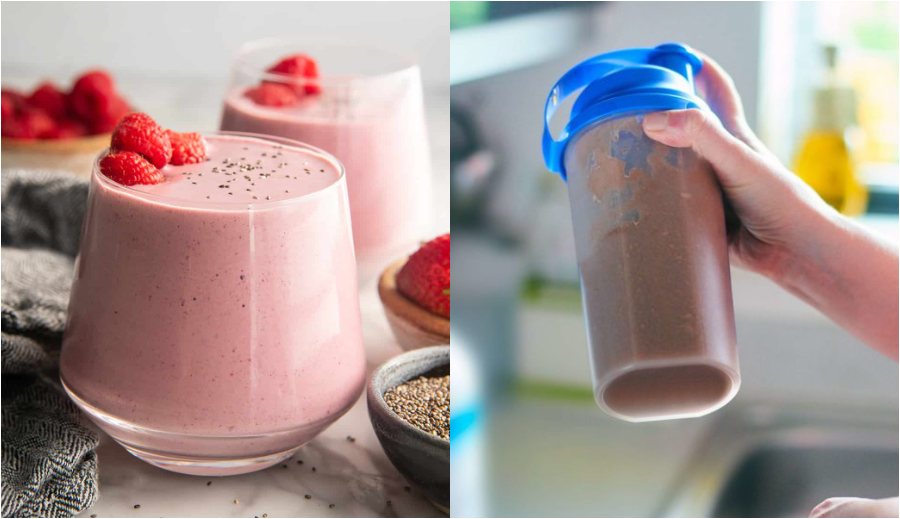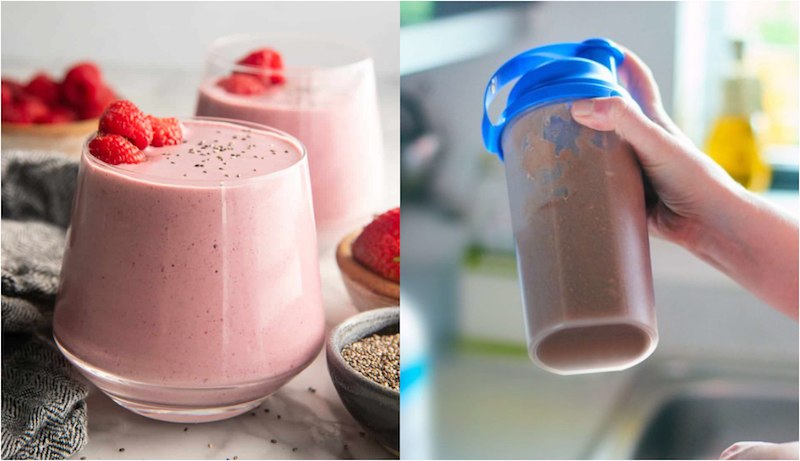5 Best Plant-Based Protein Powders To Replace Whey Protein
Protein is an essential nutrient for the human body, and it can play a crucial role for those who are looking to lose weight in a healthy manner. Protein supports healthy weight loss by promoting satiety and fullness, boosting metabolism, building muscles, and improving overall health. Consuming protein powder, particularly for people who workout, is a good way to amp up protein intake to aid in recovery, repair, and building of muscles. There are a lot of whey protein powders available in the market, but people with lactose intolerance/dairy allergy and those following a vegan lifestyle, plant protein powders are good alternatives. It should be noted that solely relying on protein powder alone may not be sufficient for effective weight loss. You need to be on a well-balanced diet that would also get you into a calorie deficit without compromising on nutrition, for example, the diet plans on the Rati Beauty app, bring about visible results in the body in just 6 weeks. Coming back to plant-based protein powders, suitable for those on vegetarian, vegan, or dairy-free diets, these are some good options to try: 1. Pea Protein: Pea protein is extracted from yellow peas and is a great source of easy-to-digest protein, iron, and can be added to smoothies, pancake, soups, oatmeal, porridge, and even while kneading chapati dough. Pea protein is also rich in essential amino acids, particularly lysine, which can be limited in some other plant-based protein sources. You can get up to 15 gm of protein in 100 gm of pea protein. Also read: “Which Protein is Good for Women to Lose Weight – Whey or Pea?” 2. Rice Protein: Rice protein is made from brown rice and is another good option for plant-based protein. It is also easily digestible and contains nutrients such as vitamin B, E, and minerals like magnesium and zinc. You can get up to 12 grams of protein from one serving of brown rice protein powder. 3. Hemp Protein: Hemp protein is derived from hemp seeds and is a good source of protein, fiber, healthy fats, and also antioxidants. Hemp protein has 9 essential amino acids, and also nutrients like magnesium, iron, and zinc. Hemp protein may contain around 10-15 grams of protein per 30 gm serving. Hemp protein powder can be included in shakes, smoothies, porridge, pancake, and also to make homemade protein bars. 4. Soy Protein: There are some studies that point towards soy protein’s effect on reducing body fat accumulation and improving insulin resistance. Soy protein isolate can also with hormonal imbalances. It is a good source of protein, fiber, and other nutrients, but at the same time, soy is a common allergen, and thus, consultation with a doctor is recommended before including it into the diet. You can add soy protein to fruit juices, smoothies, homemade protein bars, soups, etc. Some good quality soy protein powders may have up to 27 gm per 30 gm serving. 5. Blended Protein Powder: The biggest issue with plant-based protein powders is that they do not supply all of the essential amino acids, and that’s why some plant-based protein powders are made by blending multiple plant protein sources, such as pea, rice, hemp, and even pumpkin and sunflower seeds, to create a more complete amino acid profile and provide a well-rounded source of protein. You can get up to 30 gm of protein per serving and blended protein powder can be used in smoothies, soup, chia pudding, pancakes, etc. Summing up, when choosing a plant-based protein powder, do read labels and choose from reputable brand that uses minimal processing and avoid added sugar, artificial flavour and colors. Don’t pick the protein powders available in the supermarket aisles, consult with dietitians at Rati Beauty to find out which protein powder will help you reach your weight loss goals. Which Protein is Good for Women to Lose Weight – Whey or Pea? 4 Best Protein Sources From Frozen Section of Grocery Store

Protein is an essential nutrient for the human body, and it can play a crucial role for those who are looking to lose weight in a healthy manner. Protein supports healthy weight loss by promoting satiety and fullness, boosting metabolism, building muscles, and improving overall health. Consuming protein powder, particularly for people who workout, is a good way to amp up protein intake to aid in recovery, repair, and building of muscles. There are a lot of whey protein powders available in the market, but people with lactose intolerance/dairy allergy and those following a vegan lifestyle, plant protein powders are good alternatives. It should be noted that solely relying on protein powder alone may not be sufficient for effective weight loss. You need to be on a well-balanced diet that would also get you into a calorie deficit without compromising on nutrition, for example, the diet plans on the Rati Beauty app, bring about visible results in the body in just 6 weeks. Coming back to plant-based protein powders, suitable for those on vegetarian, vegan, or dairy-free diets, these are some good options to try:

1. Pea Protein: Pea protein is extracted from yellow peas and is a great source of easy-to-digest protein, iron, and can be added to smoothies, pancake, soups, oatmeal, porridge, and even while kneading chapati dough. Pea protein is also rich in essential amino acids, particularly lysine, which can be limited in some other plant-based protein sources. You can get up to 15 gm of protein in 100 gm of pea protein.
2. Rice Protein: Rice protein is made from brown rice and is another good option for plant-based protein. It is also easily digestible and contains nutrients such as vitamin B, E, and minerals like magnesium and zinc. You can get up to 12 grams of protein from one serving of brown rice protein powder.
3. Hemp Protein: Hemp protein is derived from hemp seeds and is a good source of protein, fiber, healthy fats, and also antioxidants. Hemp protein has 9 essential amino acids, and also nutrients like magnesium, iron, and zinc. Hemp protein may contain around 10-15 grams of protein per 30 gm serving. Hemp protein powder can be included in shakes, smoothies, porridge, pancake, and also to make homemade protein bars.
4. Soy Protein: There are some studies that point towards soy protein’s effect on reducing body fat accumulation and improving insulin resistance. Soy protein isolate can also with hormonal imbalances. It is a good source of protein, fiber, and other nutrients, but at the same time, soy is a common allergen, and thus, consultation with a doctor is recommended before including it into the diet. You can add soy protein to fruit juices, smoothies, homemade protein bars, soups, etc. Some good quality soy protein powders may have up to 27 gm per 30 gm serving.
5. Blended Protein Powder: The biggest issue with plant-based protein powders is that they
do not supply all of the essential amino acids, and that’s why some plant-based protein powders are made by blending multiple plant protein sources, such as pea, rice, hemp, and even pumpkin and sunflower seeds, to create a more complete amino acid profile and provide a well-rounded source of protein. You can get up to 30 gm of protein per serving and blended protein powder can be used in smoothies, soup, chia pudding, pancakes, etc.
Summing up, when choosing a plant-based protein powder, do read labels and choose from reputable brand that uses minimal processing and avoid added sugar, artificial flavour and colors. Don’t pick the protein powders available in the supermarket aisles, consult with dietitians at Rati Beauty to find out which protein powder will help you reach your weight loss goals.












